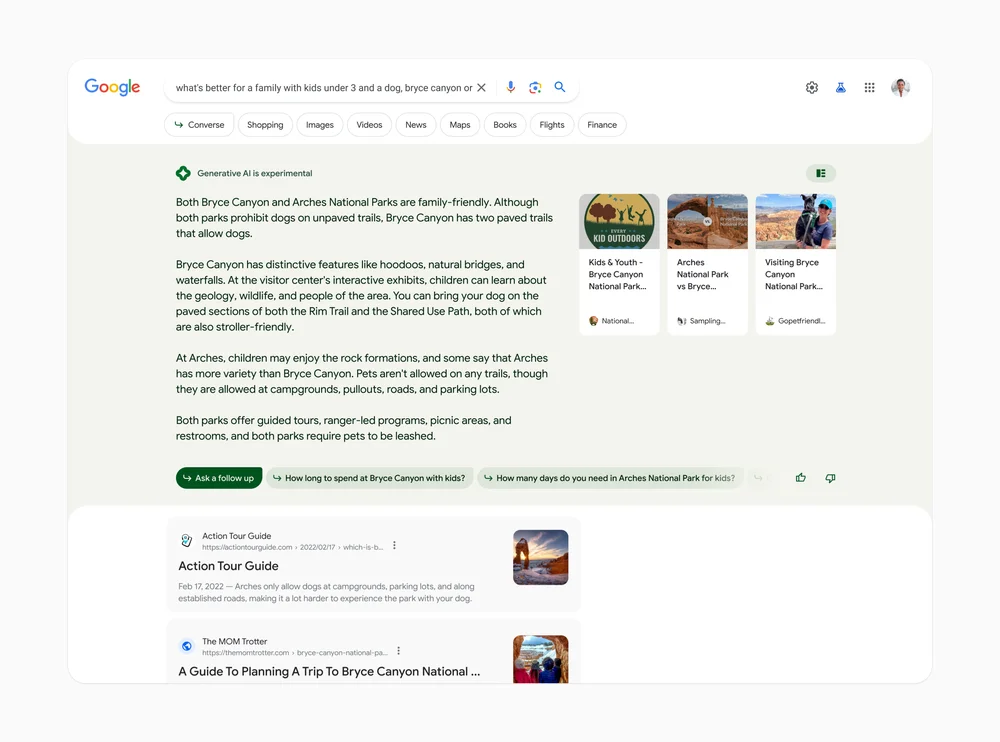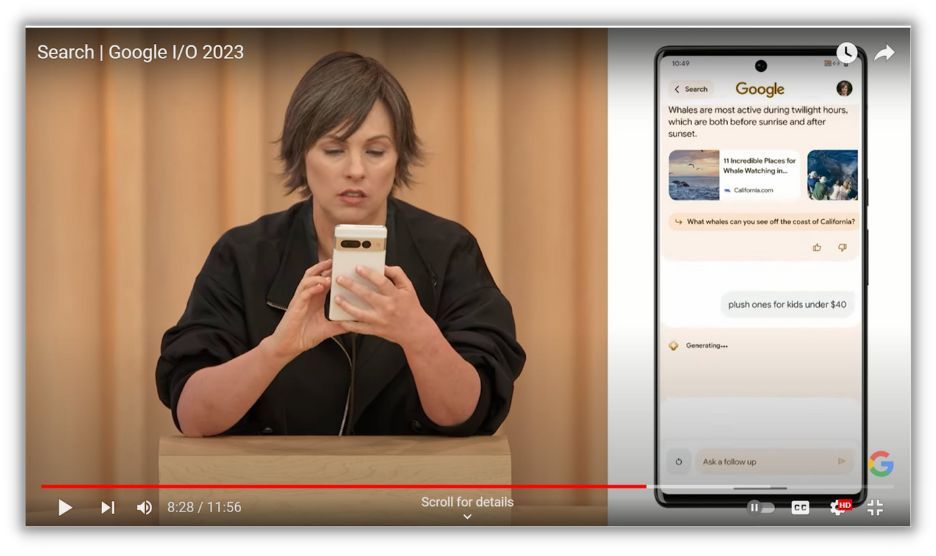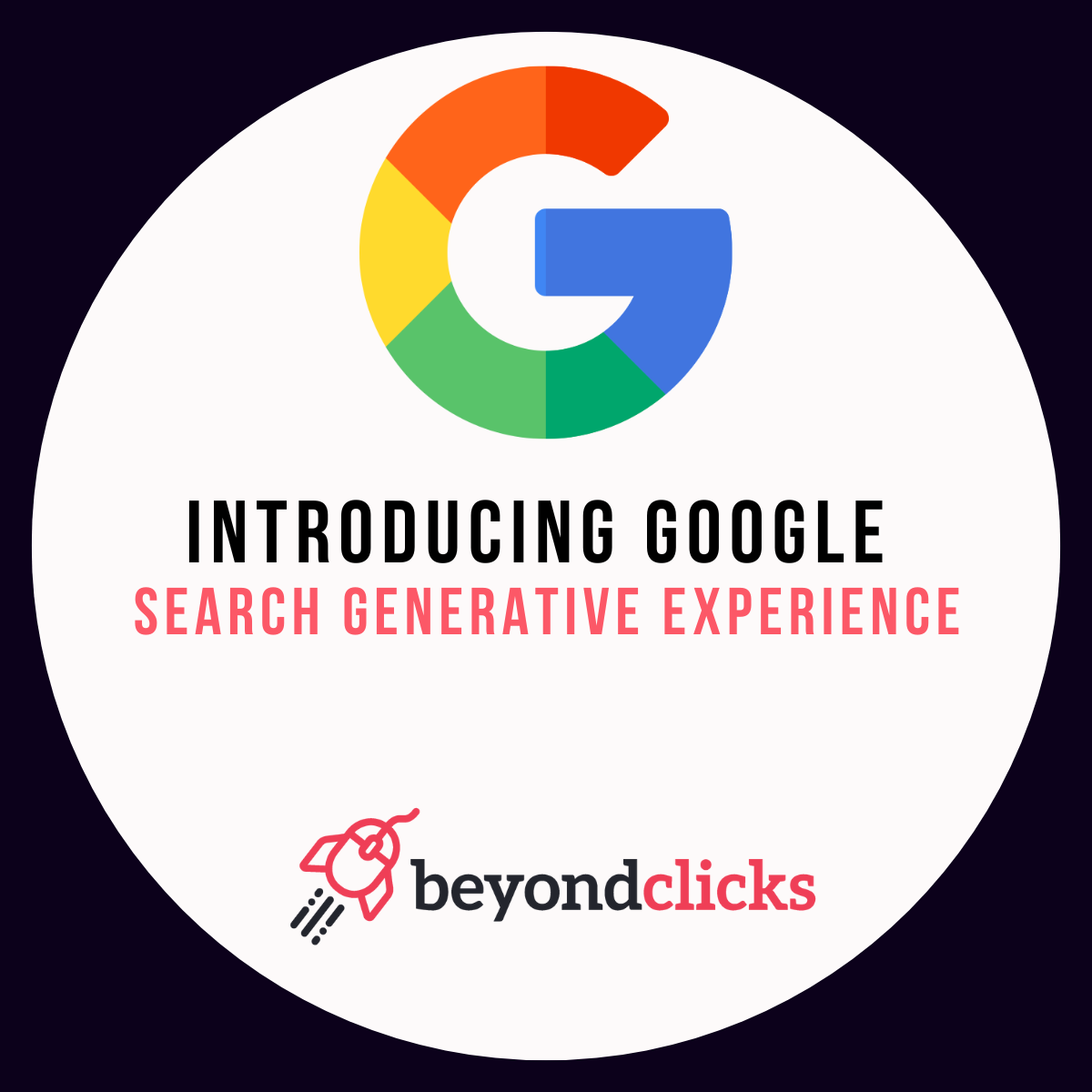In the ever-evolving realm of technology, google continues to push boundaries & enhance the search experience for users. Google has now announced a ground breaking feature known as the Google Search Generative Experience (SGE) which uses artificial intelligence to provide AI-generated answers that appear above the traditional search results listing. This new feature is dubbed to be the biggest visual change yet to the SERP!
But how will this new feature work?
When a user generates a query, Google’s AI algorithms analyse the query & scan the web to gather relevant information from various sources. AI integrates the information into a coherent & helpful response which is displayed at the top of the search results page.
This will begin as an opt in experiment and Google insists that driving traffic to websites will still be their sole focus & search ads will still remain the ‘native part of SGE’ but how will search ads work on SGE?
3 ways to enhance SGE Experience:
AI Snapshot: AI Snapshot refers to a new Google which offers concise summaries & relevant information in response to longer search queries. It utilises artificial intelligence algorithms to generate a brief overview or snapshot of information extracted from multiple cited sources. The aim is to provide users with quick & relevant information without requiring them to click on multiple search results. These snapshots may include text, images, links, or expandable content, all tailored to match the user’s query & provide a comprehensive yet concise response. In terms of paid & organic search traffic, there is likely to be fluctuations in impressions, traffic & advertising costs but we will certainly be monitoring this closely with our client ad campaigns.

Conversational Mode: The original search answer will be prominent but will also answer follow up questions in the form of conversational mode. Users can request a follow up or use the next step under the snapshot. In the example below, we see that the response to the query has been taken out of context which would obviously impact paid advertisers. Going forward, we will recommend the inclusion of phrase & broad match keywords to ensure search queries are capturing these broader searches. In addition, it will become more essential to regularly monitor search terms & how negative keywords are impacting your campaigns.

Vertical Experiences: SGE also works with vertical search experiences such as shopping search results. SGE will create an informal synopsis using AI. It will display relevant products, images, descriptions & reviews. Users can then add follow up questions to streamline Google’s response. Our recommendation to compete with vertical experiences is to ensure you add image extensions to ads wherever possible to compete in visual searches.
Additional Considerations:
Verification & Credibility:
There has been much talk about AI & its credibility/accuracy. In answer, Google has promised to take great care in ensuring the reliability of the generated information to make sure it is as accurate as possible to dispel these concerns. To achieve this, Google will meticulously reference the websites it utilised to help generate the answer. By citing the sources, Google empowers users to evaluate the information provided & verify it from the original context if they wish. This transparency is intended to reinforce trust & encourage users to rely on the AI-generated answers.
Continuous Improvement & Feedback:
Google understands the importance of user feedback when refining its search experience. Users can provide feedback on the AI-generated answers through the ‘feedback’ option available alongside the search results answer. By sharing feedback, users contribute to the continuous improvements of the generative experience, which in turn will help Google to fine-tune its algorithms & deliver even better results in the future.
How will SGE impact advertisers using Google Ads?
Increased Competition:
With AI generated answers occupying a prominent position at the top of the search results page, advertisers will face increased competition. Users may be more likely to engage with AI generated answers, especially for quick & straightforward queries, potentially reducing the visibility & click through rates of traditional search ads.
Niche Queries & Consumer Trust:
While the aim of AI is to excel at providing concise & accurate responses to general queries, advertisers in niche industries or with highly specialised products or services may find an opportunity to stand out. Users seeking detailed information, personalised recommendations or specific expertise may still prefer to explore traditional search results & click on targeted ads that align with their specific needs & come from brands they already trust. So our top tip is to evaluate existing ad copy & ensure you are promoting your USP’s & tying in keywords wherever possible.
Evolving Ad Formats & Strategies:
To adapt to the evolving search landscape, advertisers may need to reassess their ad formats & marketing strategies. Creating compelling & engaging ad copy, focusing on unique value propositions & emphasising specialised expertise can help differentiate ads from the AI generated answer. In addition, exploring alternative ad formats like visual ads, video ads or interactive elements can potentially increase the ability to capture user attention & increase click through rates.
Utilise Extended Ad Formats:
In time, Google may introduce new ad formats or extensions to help advertisers capitalise on the AI-generated answer feature. If these are introduced, advertisers can use additional extensions to provide more detailed & comprehensive information directly within their ads, ensuring maximum visibility & increasing the chances of attracting user clicks. By aligning your ad content with AI generated answers, it will be possible to enhance ad relevancy & credibility.
Conclusion:
Google is certainly stepping up with this significant advancement & the way users interact with search results. The theory is that generative AI will improve the speed & accuracy of search results whilst also addressing the credibility issue of the search experience. With recent changes in privacy laws over the last two years, Google continue to ensure transparency & promote trust amongst its users.
These advancements will be subject to further testing as they are rolled out as there have been some teething issues;
- Currently there are queries that SGE simply cannot answer
- SGE has also been reported to starting generating a response to a query but actually not fulfilling it.
- Others have reported that despite enabling SGE, their search results page actually looks no different with the inclusion of SGE.
- SGE has posed issues with the connotation of queries (applying the correct meaning e.g. distinguishing whether a Jaguar is referencing an animal or the car manufacturer) so whilst this is revolutionary, there is still a way to go for this to become fully effective before it fully impacts paid search.
As these new features are rolled out, we are looking forward to how these changes will impact SERP’s & we will be closely monitoring & refining campaigns to stay ahead in the dynamic digital advertising landscape.
For more information on Search Generative Experience, give us a call 01277 424 924.
